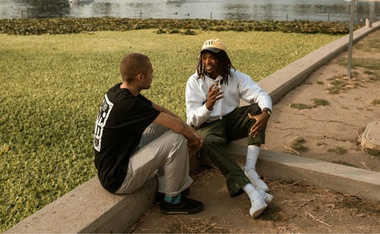The views expressed in our content reflect individual perspectives and do not represent the authoritative views of the Baha'i Faith.
How can we discuss controversial topics more effectively without harming valuable friendships? How can we collectively become better at having these conversations?
Over the years, I have had conversation after conversation where I wound up discussing difficult topics — the importance of trusting Black women, the effects of patriarchy on our reality, and how tone policing folks of oppressed identities is yet another form of controlling them — with people who disagreed with me. I often left these conversations with a pounding headache.
But I have come to realize that, while I may not always be the one personally responsible for a conversation, as difficult as these conversations often feel, they have to be had for people’s thinking to progress. We can’t move far on our own if we don’t all move forward. We are all intrinsically interconnected — so as long as suffering, injustice, and ignorance persist, all of us feel impacted.
Trust in Social Science
A common barrier I face is the distrust and lack of familiarity many people have towards social science. I regularly find myself sharing realities that scientists researching race, gender, and different inequalities have empirical evidence about, but I feel frustrated when others prefer uninformed opinions over data.
RELATED: Navigating Controversial Conversations as a Black Woman

This is not to say that we all have to familiarize ourselves with every discipline of social science before engaging in meaningful conversations. That would be unrealistic and probably unproductive. It is also not to say that some of the fruits of social science are not biased or faulty themselves, but many people opt to hide their ignorance rather than having conversations about scientific lines of thought that might be able to clarify things.
The Baha’i teachings elevate both scientific and spiritual knowledge to the same level when it comes to understanding the world around us: “Scientific knowledge is the highest attainment upon the human plane, for science is the discoverer of realities. It is of two kinds: material and spiritual. Material science is the investigation of natural phenomena; divine science is the discovery and realization of spiritual verities. The world of humanity must acquire both. A bird has two wings; it cannot fly with one.”
One way that folks can navigate and actively participate in conversations is through asking questions and being receptive to learning. If someone informed shares their perspective, even if it is uncomfortable, considering — even if skeptically — the fruits of science can be very helpful in understanding the realities of the world.
An Attitude of Learning
Open-mindedness allows us to consider the fruits of science without naively accepting them. Science is ever-evolving, as is our social reality, and so we also have to consider the feelings and experiences that formal scientific efforts do not accurately represent. For example, social science can provide some level of clarity. Still, it isn’t an antidote for the stress that many Black women face when having these conversations, and funding for scientific studies has historically focused on research that benefits the wealthy and white.

Abdu’l-Baha, the son of the prophet and founder of the Baha’i Faith, Baha’u’llah, offered guidance on how to approach these difficult conversations. He explained that everyone should speak to each other “with the utmost devotion, courtesy, dignity, care and moderation to express their views.” He also explained how we can react when others disagree with our posture: “If another contradicts him, he must not become excited because if there be no investigation or verification of questions and matters, the agreeable view will not be discovered neither understood.”
This can be difficult, but Abdu’l-Baha said that no matter the circumstances, we should always try to “see all men as friends, for love and unity come hard when ye fix your gaze on otherness.” When we look to others, we should “see where they excel, not where they fail.” When we adopt a sincere posture of learning when speaking to each other and understand each other’s experiences, we remove these barriers to unity.
As people adopt an attitude of curiosity and learning, I suspect many of us will navigate fewer unsettling hard conversations.
RELATED: Silence: The Most Important Part of Communication
Self-Awareness and Knowing When to Walk Away
When I am talking about race, gender, or some other area where I am of the oppressed identity, I have to try to practice a special awareness of my needs and feelings. I have also realized that I have to tap into my needs. I have to find ways to respond to what my body is telling me when I am in these conversations — whether it’s a headache, nausea, anger, or the urge to cry. Sometimes I have to step away, write out my thoughts, or reach out to friends and family that listen and understand where I’m coming from.
The Baha’i writings encourage us to take care of our health. This includes navigating stressors that can be toxic to our well-being and get in the way of contributing to the betterment of the world around us. “If you take better care of your own health, and build up your reserves, it would certainly be better for you and for your work. Then your sensitive, yearning heart, although you may still often suffer for and with others, will be better able to withstand its trials, and you will not get so exhausted…”
There are also situations that it may not be timely or useful to try and explain your perspective. Baha’u’llah wrote: “Not everything that a man knoweth can be disclosed, nor can everything that he can disclose be regarded as timely, nor can every timely utterance be considered as suited to the capacity of those who hear it.”
With this in mind, I give myself the flexibility to trust what my body and mind need. Sometimes that is to speak my truth openly and honestly, and other times it is to sit and listen — or simply walk away from a conversation for the sake of my nerves and peace of mind.
I try to practice care when deciding when to disengage from a conversation. I don’t allow myself to check out of conversations where I identify with the normalized or privileged group just because something is uncomfortable or hard to talk about. When the conversation takes a turn towards defending issues directly tied to my identity, I’m careful to be protective. Forcing myself to engage in conversations where I’m being triggered is a slippery slope, so I choose wisely when sharing that part of myself.
















Comments
Sign in or create an account
Continue with Googleor